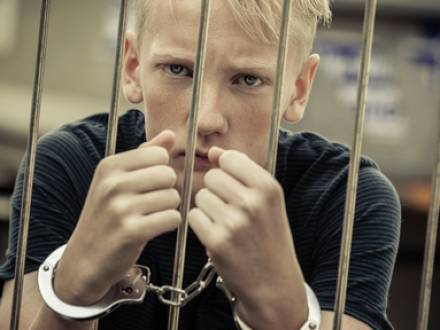Lawmakers Attempt to Make Youth Sentencing Reforms Retroactive
 Although Illinois banned life sentences for juvenile offenders under the age of 21 in 2023 (Public Law 102-1128), the law was not made retroactive. A bill to ensure that juvenile offenders who are already serving life sentences receive the same consideration stalled last session. While lawmakers tried again this year, the bill failed on a 49-51 vote on April 11.
Although Illinois banned life sentences for juvenile offenders under the age of 21 in 2023 (Public Law 102-1128), the law was not made retroactive. A bill to ensure that juvenile offenders who are already serving life sentences receive the same consideration stalled last session. While lawmakers tried again this year, the bill failed on a 49-51 vote on April 11.
A young man who was with his cousin in 1998 when the cousin robbed a store and killed two people – and who has consistently claimed he had no idea what his cousin planned – is currently serving a life sentence under the "accountability theory." The young man had no weapon, physically killed no one, and his cousin confessed to the murders.
The accountability theory says that "lookouts" and "getaway drivers" must be held to the same standards as the gunman if a death occurs during certain violent crimes. The young man is now 48 years old and has spent more than half his life in prison. If Illinois lawmakers do not make the original bill retroactive, he will spend the remainder of his life in prison.
Illinois is also one of only 17 states with no discretionary parole. Youthful offenders can only seek parole if they were sentenced after 2019. While the passage of this bill is important for juvenile offenders sentenced to life in prison, lawmakers will now have to try again next year. If your child is facing criminal charges for a violent crime, it is extremely important that you speak to a knowledgeable Grundy County, IL criminal defense lawyer who is experienced in juvenile defense.
Juvenile Laws in Illinois
Generally speaking, a defendant who is 17 years old or younger who commits a criminal offense will be charged as a juvenile defendant. However, more serious or violent crimes can result in a juvenile over the age of 15 being charged as an adult and sentenced as an adult.
While a juvenile has the same protections and freedoms as an adult under the Illinois Constitution and the U.S. Constitution, few juveniles fully understand that they should not speak to the police without a parent or an attorney present. An attempt must be made to find the juvenile’s parents before the police question him or her.
What is the Process in Illinois Once a Juvenile is Arrested?
Illinois law requires police officers to take juveniles to an officer who has received training in juvenile arrests. From this point, there are a couple of scenarios that may occur, including:
- The juvenile can be formally charged by the police.
- The juvenile may be placed in a diversion program under a "station adjustment."
What Is a Station Adjustment?
A station adjustment is an alternative to formal charges, allowing the juvenile to avoid criminal prosecution. The juvenile is released to a parent or guardian, with certain restrictions, including curfews, prohibitions from socializing with gang members, alcohol and drug counseling, or community service. A station adjustment can be formal or informal. Informal station adjustments do not require the juvenile to admit guilt, while a formal station adjustment does.
A detention hearing before a judge must occur within 40 hours if the juvenile is formally arrested. A delinquency petition will be filed if the state’s attorney decides to proceed. If the case goes to trial, the juvenile will have an adjudication hearing, which is similar to an adult trial. When tried as a juvenile, the individual can receive supervision, probation, intensive probation supervision, residential treatment, juvenile detention, or juvenile prison.
Contact a Will County, IL Juvenile Defense Lawyer
If your child is in trouble, it is important that you seek highly experienced legal representation on his or her behalf from a Grundy County, IL juvenile defense attorney. Attorney Zaremba has this level of experience and will fight for your child’s rights and his or her future. Contact Law Offices of Jack L. Zaremba, P.C. at 815-740-4025 to schedule your free consultation.
















